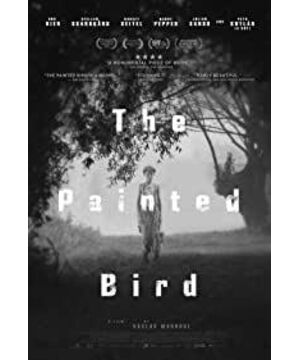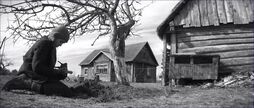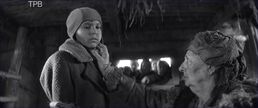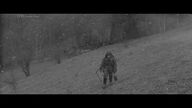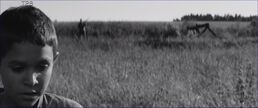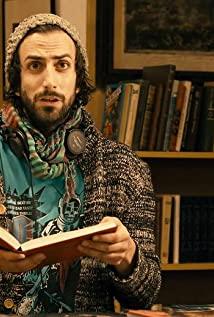"The Smeared Bird" should be said to be a very unpopular film. The duration of nearly three hours is enough to persuade many people. Its content is adapted from a film about Eastern Europe written by a well-known Polish writer. It is a novel of war, and the main battlefield of World War II was never Eastern Europe or Poland, so the marginality and obscureness of the content will also bring a lot of obstacles to fans watching this film.
But if you can see the film to the end in one breath, you will find that this story organized in chapter structure is better than imagined, and it will also smear the "eyes" in this film: smeared of birds have a deeper understanding.
This film is not the first film to divide the plot with the novel's "chapter body", nor is it the first film to describe the cruelty of war. There are many films that describe the cruelty of war, and "Warren" is one of them. Smeared Bird is not a film that is meant to highlight brutal imagery, it has a mind of its own.
Before we talk about "The Painted Bird", it is necessary for us to know the position and experience of Eastern Europe in history. Many people do not understand Eastern Europe because it is often treated too coldly, compared to the developed and united Western Europe. , Eastern Europe has no features. Not only is its economy backward, but it has been seized by other countries for a long time in the last century and cannot move.
The impact of economic backwardness is multi-faceted. Their ignorant thoughts and superstitious customs are all dragged down by the status quo of poverty and backwardness, and are controlled and manipulated by extreme emotions.
Friends who have watched "Warren" should remember that at the end of the film, the people in the film killed their neighbors just because they did not belong to their own camp, and the reason for the slaughter was very simple, because these neighbors turned into demons , leading to their poverty, weakness, fear and everything!
They believe in primitive desires and rituals, because poverty makes them unable to choose, and the outbreak of war has caused poverty to continue to increase, and faced with a life of embarrassment, how did they do it? Their first thought is not to escape this predicament and rely on their own hands to achieve wealth, but to find the possessor of the devil, find a scapegoat, and pray for God's mercy by offering sacrifices.
This is the violence created by ignorance and ignorance.
And this is the source of most of the malice in the world.
The protagonist in "The Painted Bird" is a boy, he is a Jew, such an identity is dangerous in times of war. At the beginning of the film, he is running away, in order to avoid the several children chasing him behind him, Their aim was to kill a mink in the boy's arms.
Although he tried his best to escape, the boy was still caught, and the mink could not escape. He was burned alive by several children. With tears in his eyes, the boy looked at the dead mink, but couldn't do anything.
This is the beginning of the movie, and it is also a very cruel beginning. It uses the death of an animal to announce the end of a boy's childhood. If you can understand this clip, then you can understand the burning image of Grandma Talma in the back. .
There is no lack of malice in this world, and the malice suffered by the protagonist is just the beginning. After this cruel opening, the story opened the "curtain" of the first chapter, and gave this chapter a title: Tal Ma.
It is necessary to mention that there are eight more titles like this in the length of the film that follows, and the chapters are set so that the film is structurally similar to the novel, which also helps to distinguish the plot from the same and different in the plot, Pulp Fiction The success of the film is enough to prove that the chapter titles in this film mostly play the role of clarifying the role, so here you only need to substitute the title into the role.
Talma, the boy's grandmother Talma.
Talma did not comfort him in the face of what happened to the boy, but warned him that she had already told him not to run out alone. Obviously she knew what a Jewish child would encounter outside during the war. The boy bowed his head and silently admitted his mistake, Tal Mar went on with her work, and the boy joined.
The story of Talma and the boy is the most bland of these chapters. It was probably not until her sudden death while soaking her feet that the story made some waves. At first, the boy didn't find out about his grandmother's death, just From morning to night, the boy did not see Talma leave his room. From the boy's perspective, she was always sitting in his chair, as if thinking about something.
In the evening, he quietly walked into Tarma's room and approached Tarma with a candle, only to find that she had died. He was so frightened that he threw the candle away. The fire of the candle lit Tarma's clothes, and then , the fire grew bigger, and Talma's body caught fire.
The boy escaped from the house, and the fire soon engulfed their house. The boy looked at the burning house with lingering fears. There was nothing left of the house and Talma, and the story of the boy and Talma ended.
Let's not judge the pros and cons of this chapter first. Let's review the first few chapters of the whole movie, and then it's not too late to find clues. Talma's story ends because of Talma's death, then the next , the second chapter begins.
The title of the second chapter is: Olga.
Compared with the singleness of the grandma's character in the first chapter, there are many more characters in the second chapter, which makes it not so easy for us to find this character called Olga.
Chapter 2 begins with a group of people surrounding the boy, kicking him, insulting him, and treating him as a demon, an incarnation of evil, probably because the boy accidentally burned down his grandma's house, or maybe more of us There was no reason to see it, and later, the boy was dragged to the witch by the crowd, and the witch was left to the disposal.
The witch agreed with everyone's opinions and accused the boy of his sinful incarnation, but brought him to her side, which saved the boy's life. Since then, the boy has been working with the witch to fight the witch.
People need witch's spells to save their dying relatives and friends. The boy saw a lot of tragic scenes and saw people's trust in witches. Even if sometimes witches said they were powerless, they also believed that it was God's will. There is no more hope left.
The witch is the embodiment of people's kindness to God, and the witch's magic ritual is that she is bringing kindness to the mortal people, so she wants to keep the boy, no one dares to have an opinion.
You can guess without me saying that this witch is Olga in the title.
Olga was the first recipient the boy met during his journey. He accepted the boy and gave him shelter. Although he almost died in the river because he didn't notice the villagers' malice towards the boy, she did. Give the boy a chance to survive.
Later, the boy floated away along the river, and the story with Olga came here.
The title of the third chapter is Miller.
The man rescued the boy ashore and took him to the employer's house. He is the employee of the family (in fact, I'm not sure if he is, maybe a father and son), and works for the employer's husband and wife. Although the employer is a little dissatisfied, he still lets the boy left behind.
Later, the employer's wife gave the boy some clothes of her own child, and their own child left for some reason, and she was beaten badly by the employer because the employer felt that she was no longer interested in childbirth because of her old age. possible.
Later, at the dinner table, the employer got angry with the look the employee gave to his wife during the day, gouged out the employee's eyes with a spoon, and threw him out. The frightened boy did not want to stay any longer, and took advantage of the night to leave this dangerous place with the help of his employer's wife.
When he left, he found the man whose eyes had been gouged out. He returned the eyes of the man he picked up to the man. The man held them tightly and wept bitterly. The boy was powerless and left silently.
Regarding the Miller in Chapter 3, it should be the character I am most uncertain about. Is the man whose eyes were gouged out by Miller, or is the violent employer Miller? Olga can clearly identify it, because the witch is the one closest to the boy, and in the story of Chapter 3, no one has an intimate relationship with the boy, it is just a bystander.
So here, we might as well leave a question first, look at the next story first, and then talk about it later.
However, starting from the witch chapter, in fact every chapter is a small story, in a way, it alludes to some problems in the society in which the boy lives, so it doesn't matter what the boy does, it matters. What he learned in those stories and what he practiced in later stories.
In short, this is a movie that makes people learn to be evil.
The title of the fourth chapter is: Lake and Ludmilla, which tells the story of love and sex between a man and a woman who have a wonderful agreement. They will meet in a secret place, and the boy, because of his tree-climbing skills, becomes a man. The man's helper for catching birds.
But later, the woman was chased and beaten by the women because she was cheating with the young men in the village. People beat her while scolding the slut, and beat the man who came to protect the woman until she was tortured to death. When he was willing to give up, the man took him home, but she eventually died in the man's house, and then the man also hanged.
The story of Lake and Ludmilla ended in a hurry.
The Hans in the title of Chapter 5, the priest and Garbos in Chapter 6, Rabina in Chapter 7, and Mitka in Chapter 8 are all about themselves, and the boy's intervention is nothing more than I want him to witness these processes.
As I said earlier, the beginning of a war is a bad thing for a Jew. If you treat a Jew or a child, it is enough to show a person's humanity. All salvation and protection can make a person good, but absurd, sinful, and lustful. And hatred, but all can make people violent and crazy.
War cannot destroy a person, but human nature can.
In the fifth chapter, Hans, a member of the Nazis, chose to let go of the boy when he could kill the Jews, which is a kind of redemption;
Chapter 6, the agreement reached between the hypocritical Gapos and the good priest made the boy imprisoned by Gapos fear, anger, and hate, which also prompted the boy to kill Gabos's son with the help of the rats in the abandoned pit. indirect cause;
Rabina, a sex addict in chapter 7, whose disappointment with the boy is palpable, arouses the boy's jealousy, he kills Rabina's goat to solve her addiction, and throws the goat's head into Rabina's room , as a form of revenge;
In Chapter 8, Mitka faced the villagers who killed him, shot several villagers with a sniper rifle, and told the boy to "an eye for an eye and a tooth for a tooth". Later, in Chapter 9, the boy personally After implementing this, he killed the man who blatantly insulted him.
Except for the ninth chapter, the first eight chapters all reflect the various characteristics of human nature to varying degrees. The first chapter is loneliness, the second chapter is jealous, the third chapter is jealous, the fourth chapter is prejudice, and the fifth chapter is Kindness, chapter six is hypocrisy, chapter seven is lust, chapter eight is hatred.
These emotional words can be understood by themselves, but they are fully displayed by the film and witnessed by the boys one by one, which is enough to show their intentions. The film wants to use these stories to explain the absurdity that happens in the world. And ugliness, people's suspicion, expulsion and play with boys all make boys go further and further down the path of evil.
They ruined him, they shaped him, they ruined the ignorant boy, they ruined the kind boy.
In the opening chapter, when the mink died, the boy's name was taken away, and the only one who knew the boy's name was Grandma Talma. The departure of Grandma Talma represented that the boy was getting more and more away from him. The farther away, this is precisely the common plot design in magical works. Everything that happened later has nothing to do with the boy with the name.
When people beat the boy because of human malice, the boy cried and wanted to go home, but we don't know where his home is, and he may not know it himself. The journey after that is not so much a search for a home as it is In order to survive, it is not easy for a Jew to survive a war, and it is even more difficult to find a way home.
It's absurd that the boy can survive.
Absurdity originates from absurdity itself.
It's hard to describe what kind of work "The Painted Bird" is, because it's so fine-grained, the segment of the call-and-eye appears in Chapter 4, where Laker puts the white-painted bird back into the flock But the flock did not welcome the uninvited guest, an offbeat companion, and they pecked at it frantically until the smeared bird pecked it to death and fell straight to the ground.
A bird is still like this, let alone a person?
Everyone is inevitably slandered and vilified, so everyone is inevitably destined to become a smeared bird, just depends on luck.
And boy, that's the role.
In the third chapter, there is an episode that is very impressive, the boy with a high fever has a high fever, and the witch wants to help him, so he is buried in the ground by the witch in an old-fashioned ritual, leaving only his head outside, wandering in the air The crow thought he was a dead man, and tentatively landed beside him, the boy threatened them with his voice, and they were frightened away.
But after that, the number of crows became more and more, and hunger conquered fear. They swarmed up and stabbed the boy in the head frantically. No matter how much the boy screamed, it was of no use. 's life.
If there were no witch Olka, and no one to help him, the boy would surely die there. For the dead and lonely individuals, they would become the target of malicious targeting. They are the easiest people to target, and at the same time, the hardest for themselves. rehabilitated person.
If you can't find a group or a group of friends for yourself, it will become a matter of time to be isolated and targeted. The smeared bird and the corpse-eating crow are two fables that exist in the movie and deeply foreshadow the boy. tortuous fate.
Although in the end, the boy's father found him, he was still haunted by his abandonment and refused all explanations from his father, but on the train back home, he saw the prisoner's brand only found in concentration camps appear on his father's shoulders When he remembered his Jewish name: Joska.
And the title of Chapter 9 is Nicod and Joska.
The boy as a weakling, an isolated person, can live to the end of the war and reunite with his father, like a myth, which is also the source of the film's absurd style, so I said earlier that the film is not intended to describe cruelty and death , but wanted to record these images, and the boy happened to be a witness to these images.
He finally remembered his name, so, will those memories still exist after forgetting the name, can he forget those horrible memories, I think, the answer is no, as I said above, the boy is the witness whoever, he will always remember these images, whether good or dark, will become part of his memory.
And the people who build these memories are you, me, and him.
The extent of the evil of human nature is unknown, and the known words may be indescribable, but the delicate story can be closer to the essence than everything else, which is why "The Painted Bird" shocked me.
None of us can avoid being a member of the flock of birds, if unfortunately fall into the hands of human beings————
Would you be the smeared bird?
If yes, what would you do?
View more about The Painted Bird reviews


